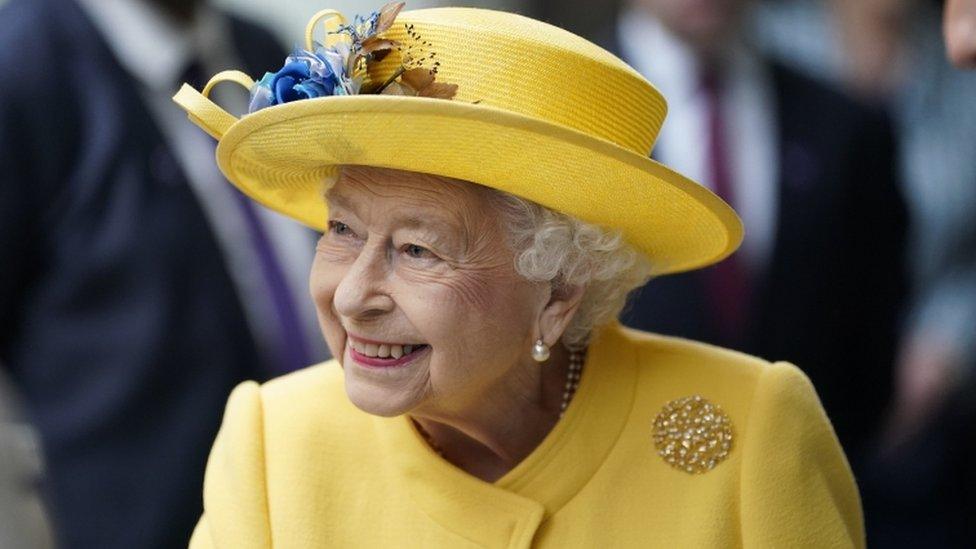Elizabeth line: What rail services could London see next?
- Published
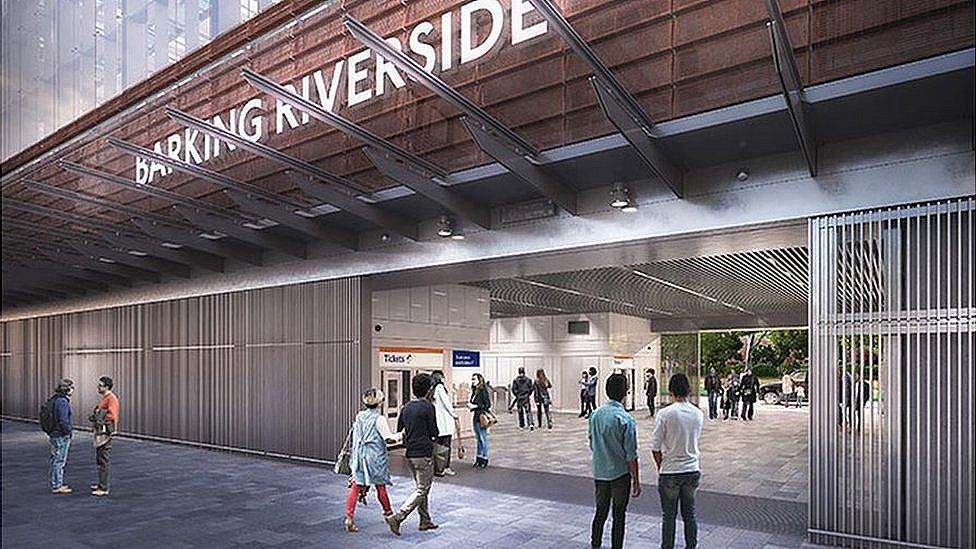
Barking Riverside is set to become TfL's newest station when it opens in the autumn
London has finally got its new purple-liveried multibillion-pound railway. After a delay of more than three years, the Elizabeth line opened to passengers on Tuesday.
According to the Office for National Statistics (ONS), London is home to more than nine million people. As its population is continuing to grow, external, rail infrastructure projects are needed to support new housing developments.
However, the government's levelling-up initiative seems to be focused on the rail network in the North, and Transport for London (TfL) ridership is down by more than 20% on pre-pandemic levels.
TfL had to be bailed out by the government due to the pandemic's lockdowns - something that could well hamper its expansion plans. Nonetheless, there are proposals both to extend existing lines and build entirely new ones. So what exactly is in store?
Crossrail 2
This is a proposed line that would connect Hertfordshire and Surrey, running from the north-east of London to the south-west via the centre.
The project is yet to get off the ground. Consultancy work by TfL was completely halted due to funding issues caused by the pandemic.
In 2014, it was estimated that Crossrail 2 would cost about £30bn but more recent figures suggest a sum north of £40bn.
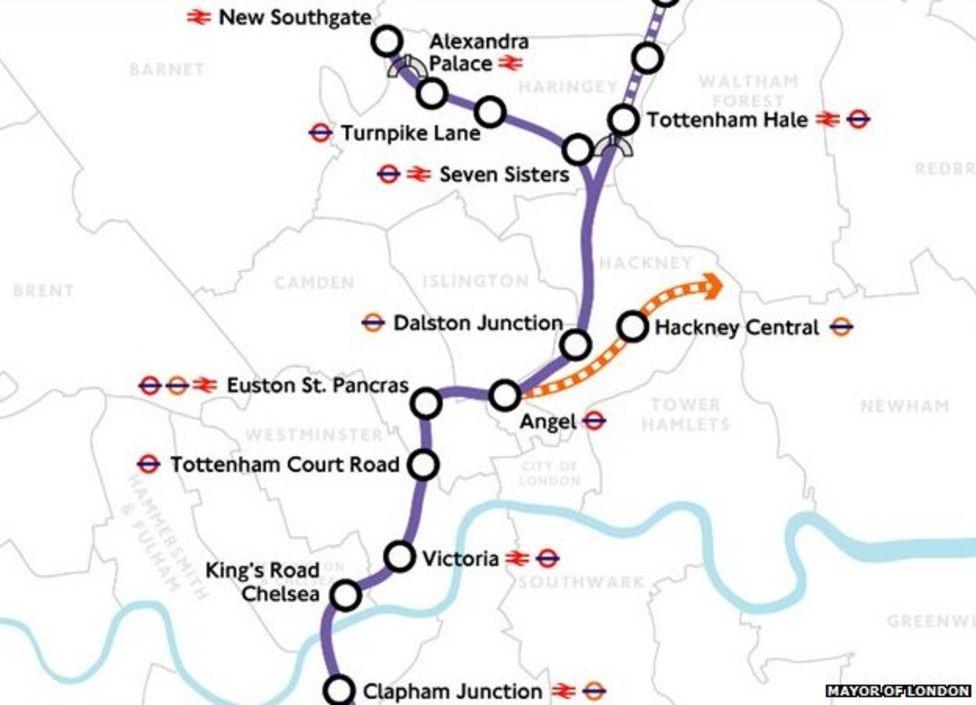
The scheme does have strong support from the prime minister, although the government says London businesses need to find a way to pay for the project.
"The real thing for us now is to think about Crossrail 2, the old Chelsea-Hackney line," said Boris Johnson, speaking at last week's unveiling of the Elizabeth line.
"That is going to be transformative again. All the problems of commuters coming into Waterloo getting up to north London, you can fix that with another Crossrail.
"I think we should be getting on with that."
Another major rail build looks unlikely, though, due to changes in the way these projects are paid for, says BBC London's transport correspondent Tom Edwards.
"The big issue with any big capital projects is obviously funding," he said.
"Crossrail cost £18.8bn, 70% of which was paid for by London. The overruns are also being paid for by the capital.
"The prime minister at the Queen's visit to Crossrail talked about using a model in the future similar to the Northern line extension to Battersea, where the developer paid a lot of the costs.
"So any new infrastructure will probably have to raise funds within the locality. The days of central government paying for everything seem to be decreasing, particularly as the levelling-up agenda isn't necessarily focused on London.
"The other issue is fares. Working from home is undoubtedly having an impact on transport operators' revenues and how much they can invest."
Barking Riverside extension
The next new London Overground station to open is likely to be Barking Riverside, on the banks of the River Thames in east London, which will be the new terminus of the Gospel Oak to Barking line.
A 4.5km extension has been added to tracks between Barking and Dagenham Dock stations, with a new viaduct being constructed to take the track over the Ripple Lane yard.
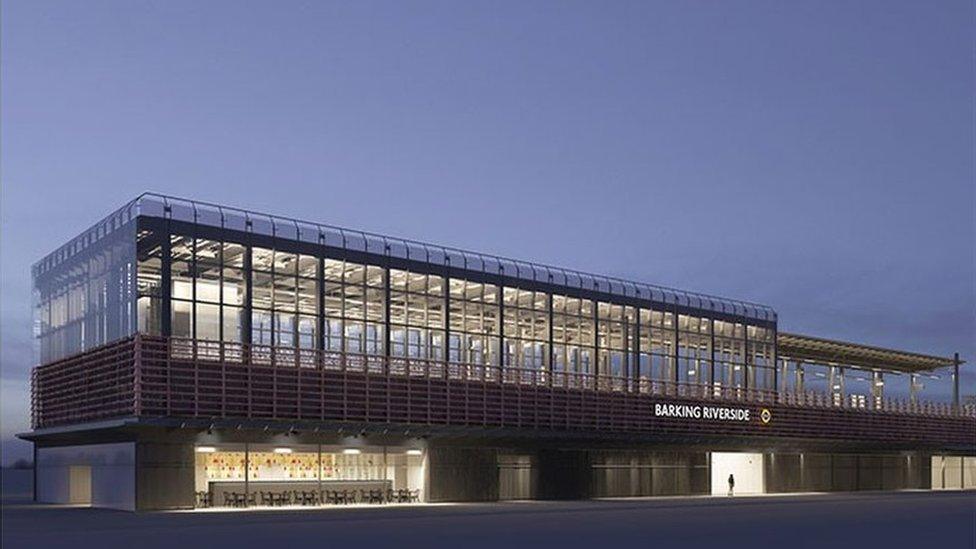
The new Barking Riverside station will have step-free access from street to train
Approved in 2017, the project is being delivered a year later than planned due to funding issues caused by the pandemic.
The extension will connect up to c2c services and the Hammersmith & City line at Barking.
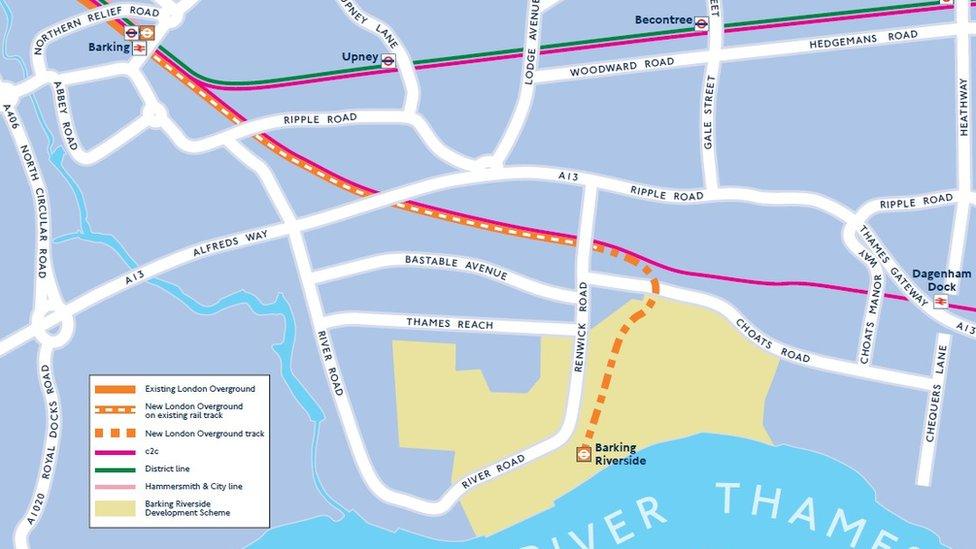
The station is expected to be in operation from the autumn, TfL says.
It will serve a newly built housing development.
West London Orbital
Another planned London Overground upgrade is the West London Orbital project.
Proposals by TfL show a new line with services running from Hounslow and Kew Bridge up to Hendon and West Hampstead Thameslink, including the construction of four new stations on the route.
Old Oak Common is expected to become a new super-hub station, connecting the Overground to High Speed 2 (HS2) services and the Elizabeth line.
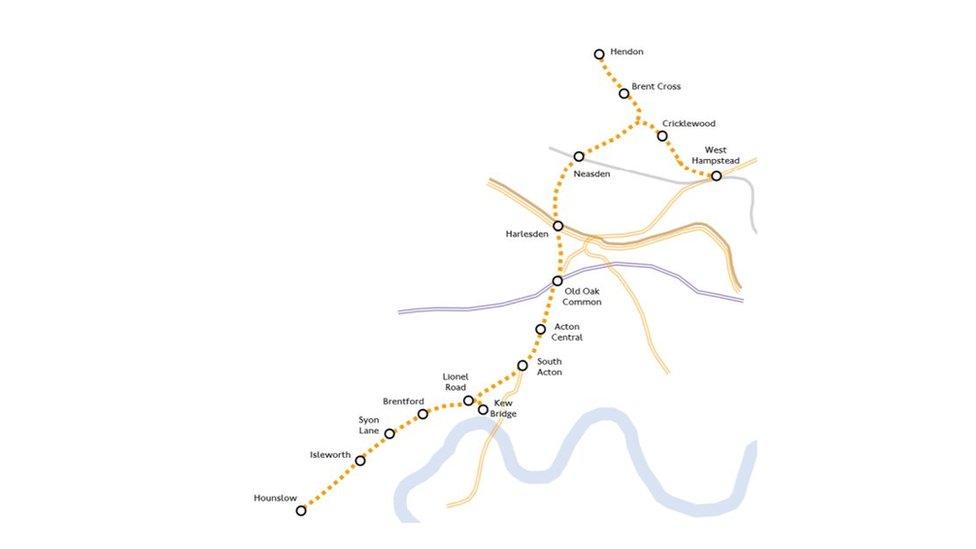
Current plans show the line running through four boroughs. It would make use of track currently used by freight services in west London.
The project is very much in its early stages, with funding yet to be identified and approval needed, but TfL says services could begin operating by the end of the decade.
Bakerloo line extension
There are plans for an extension of the Bakerloo line so it goes beyond Elephant & Castle and deeper into south-east London.
The planned line would run under the Old Kent Road, creating two new stations, before continuing on to New Cross Gate and connecting up to the Docklands Light Railway (DLR) at Lewisham.
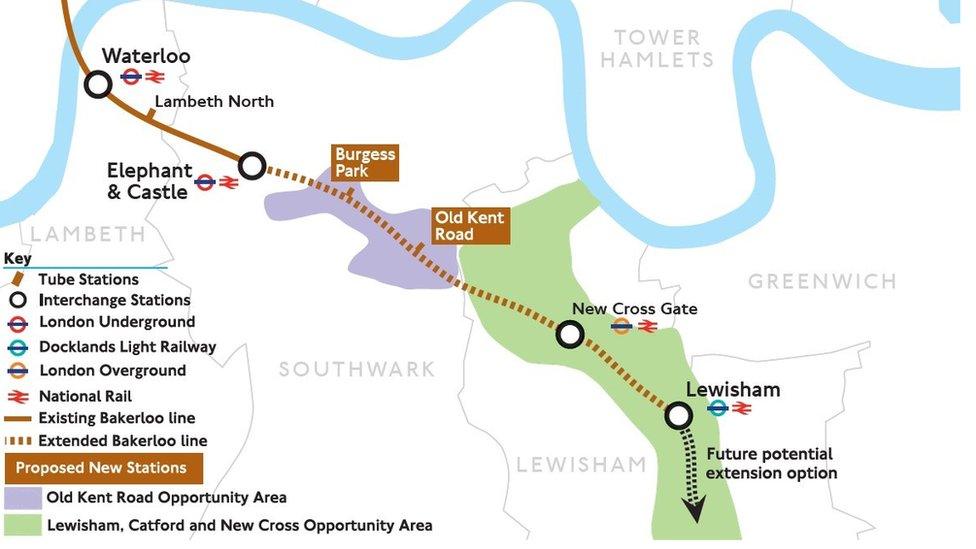
TfL says that 89% of respondents to a 2019 consultation made "supportive comments" about the plans.
TfL has also proposed a further extension of the line down to Hayes and Beckenham Junction in Bromley.
A Bakerloo line extension has been talked of since as far back as the 1930s but with funding difficult to secure, it remains unclear if the project will ever begin.
DLR extension to Thamesmead
A project to bring the DLR to Thamesmead is under serious consideration, though.
Plans show an extension from Gallions Reach station in east London under the Thames to a new Thamesmead station.
Another new station north of the river - expected to be named Beckton Riverside - would also be constructed. It has been claimed the extension could create up to 8,000 jobs in the Thamesmead Waterfront area.
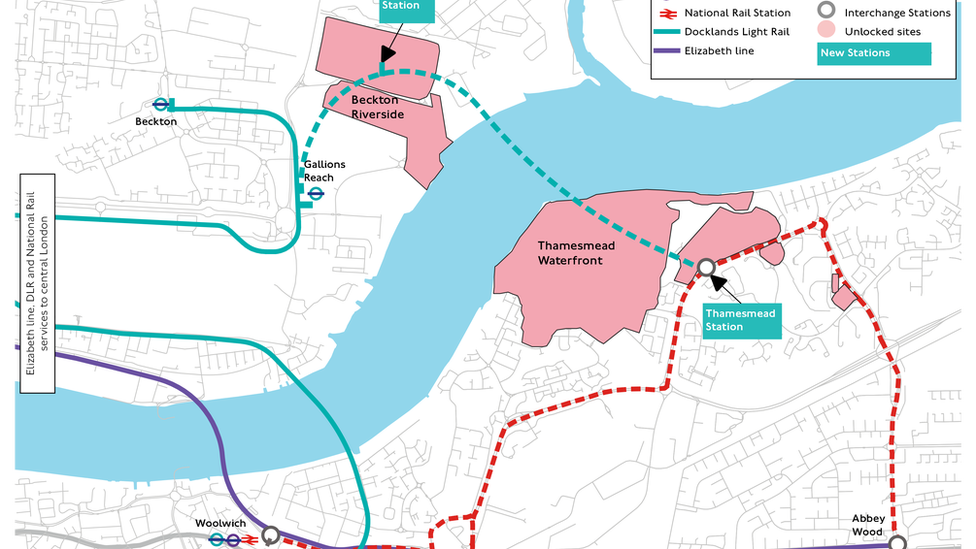
In 2020, it was announced that £1m had been raised for TfL by external partners, including the boroughs of Greenwich and Newham, to carry out a feasibility study.
The aim would be to provide better transport services for about 25,000 new homes set to be built along the route.

What will happen to London's rail network is uncertain.
The pandemic put a halt to progress on planned projects and led to huge changes in the way people work.
When you factor in national government's reluctance to pay for big rail projects, it could be a while before much more changes for passengers in the capital.
That said, Londoners can still expect to see some improvements to the existing infrastructure - starting with the new Barking Riverside station that opens later this year.
- Published18 May 2022
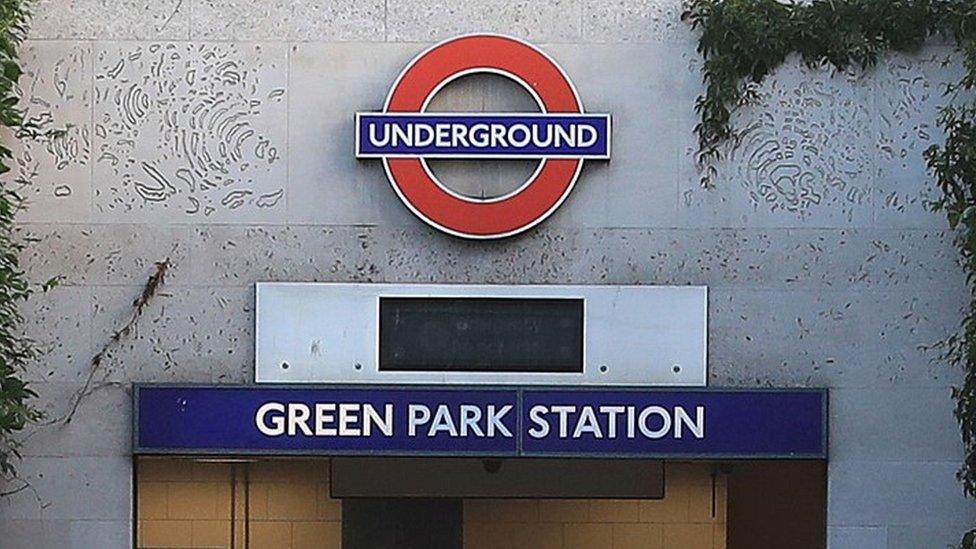
- Published28 September 2022
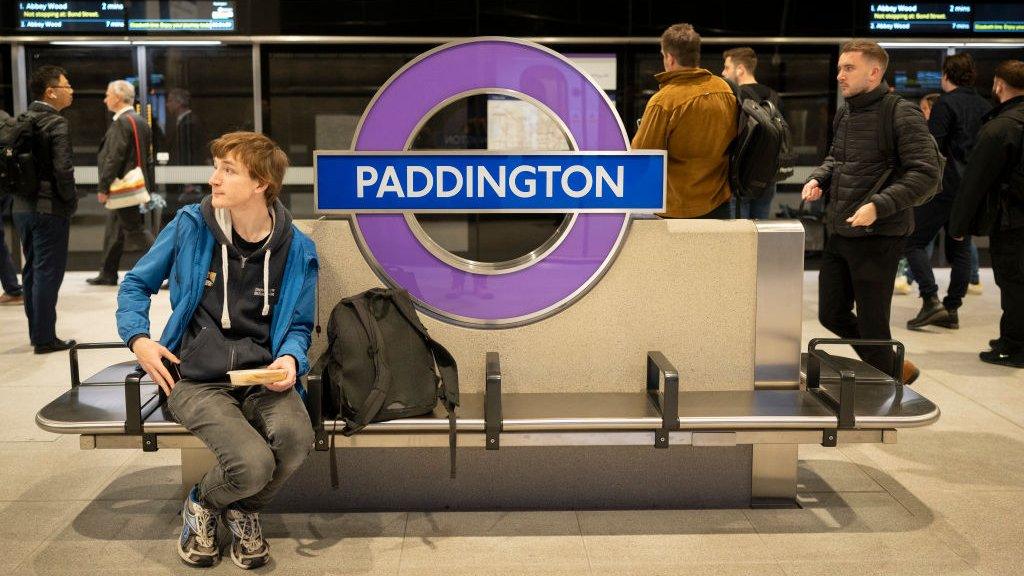
- Published17 May 2022
